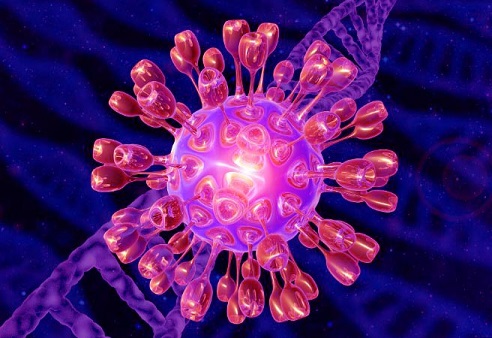Nikhil Prasad Fact checked by:Thailand Medical News Team Aug 10, 2024 8 months, 2 weeks, 2 days, 18 hours, 46 minutes ago
Medical News: Researchers from the University of Turin-Italy and the University of Piemonte Orientale-Italy have made a significant breakthrough in the fight against Herpes Simplex Virus Type 2 (HSV-2), a prevalent and often debilitating sexually transmitted infection. This
Medical News report reveals that by targeting a specific enzyme, Peptidylarginine Deiminase 3 (PAD3), the replication of HSV-2 can be markedly suppressed, offering new hope for treatment-resistant cases.
 New treatment strategy shows promise in combatting Herpes Simplex virus type 2
Understanding HSV-2 and Its Challenges
New treatment strategy shows promise in combatting Herpes Simplex virus type 2
Understanding HSV-2 and Its Challenges
HSV-2 is a common virus that affects millions worldwide, leading to recurrent genital lesions and, in severe cases, complications like neonatal herpes and an increased risk of HIV transmission. Despite the availability of antiviral drugs, challenges such as drug resistance and limited efficacy make managing HSV-2 infections difficult, underscoring the need for innovative therapeutic strategies.
The Role of PAD Enzymes in Viral Infections
The research team focused on a group of enzymes known as Peptidylarginine Deiminases (PADs), which are involved in a process called citrullination - a post-translational modification where arginine residues in proteins are converted to citrulline, altering protein function. This modification plays a role in various inflammatory diseases, and previous studies have shown that viruses like Herpes Simplex Virus Type 1 (HSV-1) exploit these enzymes to enhance their replication.
In their latest study, the researchers aimed to explore whether HSV-2 similarly manipulates PAD enzymes to support its replication. Their findings indicate that HSV-2 infection triggers the activation of multiple PAD isoforms, particularly PAD3, which plays a critical role in the virus's life cycle.
Key Findings: PAD3 as a Therapeutic Target
The study revealed that upon HSV-2 infection, there is a significant upregulation of PAD3 at both the mRNA and protein levels. This upregulation was observed as early as 16 hours post-infection, suggesting that PAD3 is crucial for the early stages of viral replication. By inhibiting PAD3, either through a specific inhibitor known as CAY10727 or using CRISPR/Cas9-mediated gene silencing, the researchers were able to significantly reduce HSV-2 replication and viral protein expression.
Interestingly, the specific inhibition of PAD3 resulted in a reduction in viral load by two to three logs, a substantial decrease that points to PAD3 as a promising target for developing new antiviral therapies.
Potential Impact on Treatment-Resistant HSV-2 Infections
The ability to target PAD3 opens up new avenues for treating HSV-2, particularly in cases where traditional antiviral drugs are ineffective due to resistance. This approach, known as host-targeting antivirals (HTAs), focuses on disrupting the virus's ability to exploit host cellular machinery, rather than directly attacking the virus itself. This strategy not only limits
the potential for the virus to develop resistance but also offers a broader scope for treatment.
The researchers also determined the half-maximal inhibitory concentration (IC50) of CAY10727, finding it to be approximately 0.3 µM, close to values observed in similar studies on HSV-1. This finding reinforces the potential of PAD3 inhibitors as a powerful tool in the antiviral arsenal.
Looking Forward: The Future of PAD3 Inhibitors
While CAY10727 has shown promise in vitro, further studies are necessary to evaluate its efficacy in vivo, including its pharmacokinetics and bioavailability. The development of PAD3-specific inhibitors is still in its early stages, and more research is needed to confirm their safety and effectiveness in treating HSV-2 infections in humans.
The study’s authors, including Dr Selina Pasquero and Dr Francesca Gugliesi from the University of Turin, and Dr Matteo Biolatti from the University of Piemonte Orientale, emphasize the importance of continuing this line of research. They suggest that PAD3 inhibitors could become a cornerstone of treatment for HSV-2 and potentially other viral infections that rely on similar mechanisms for replication.
Conclusion: A New Hope for HSV-2 Patients
The discovery that PAD3 plays a pivotal role in HSV-2 replication marks a significant step forward in developing new treatments for this challenging infection. As drug-resistant strains of HSV-2 become more common, the need for innovative therapies is more urgent than ever. Targeting PAD3 offers a novel approach that could improve outcomes for patients and reduce the global burden of HSV-2.
The study findings were published in the peer-reviewed International Journal of Molecular Sciences.
https://www.mdpi.com/1422-0067/25/16/8709
For the latest on Herpes Simplex Type 2 virus, keep on logging to Thailand
Medical News.
Read Also:
https://www.thailandmedical.news/news/herpes-virus-manipulates-autophagy-in-brain-cells-for-survival
https://www.thailandmedical.news/news/breakthrough-in-anti-herpes-treatment-thailand-medical-researchers-at-chiang-mai-university-discover-potent-algae-extract
